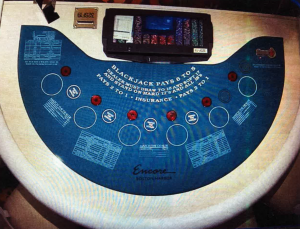Mass. Gaming Commission: Encore Boston Harbor is “in Compliance” Despite Blackjack, Slot Payout Lawsuit
Encore Boston Harbor, the Boston area’s month-old $2.5 billion casino owned by Wynn Resorts, has gotten off to a great start. Last week, though, a cloud hung over the property as A. Richard Schuster, a customer of the casino, filed a class-action lawsuit against Encore and Wynn, claiming the casino was cheating its players by only paying 6-to-5 on many blackjack tables while the games themselves were structured like those that paid 3-to-2. Schuster also alleged that Encore was intentionally making it difficult for players to receive the final bits of change from slots winnings and then pocketing what they don’t claim. The Massachusetts Gaming Division has already completed its preliminary investigation and reported on Thursday that Encore Boston Harbor is “in compliance” with all regulations.
What is 6-to-5 Blackjack?

Encore Boston Harbor Blackjack Table Source: Commission report
That Encore Boston Harbor is running 6-to-5 blackjack games is not unusual. Though blackjack has traditionally paid out 3-to-2, casinos have changed things over the years and now many only pay 6-to-5 except in higher stakes games. The difference is significant. On a $10 bet, a 3-to-2 blackjack pays $15, whereas a 6-to-5 blackjack pays only $12.
According to the Wizard of Odds website, a 6-to-5 payout adds 1.39 percent expected return to the casino’s side of the game.
While 6-to-5 blackjack payouts are awful for customers, it is a casino’s prerogative to spread these games. What the plaintiff in the suit claims is illegal is that Massachusetts gaming regulations outline specific rules as to how blackjack games must be dealt in order to have a 6-to-5 payout and these rules are not being followed.
Lawsuit Claims Codified Rules for 6-to-5 Games Not Being Followed
The lawsuit cites several regulations that the plaintiff believes were violated when played blackjack at Encore on July 11, 2019:
2(a)(1): “the minimum number of decks used to play blackjack shall be…One or two, if the 6 to 5 blackjack variation is offered….”
6a(b): “[If a gaming licensee offers the 6 to 5 blackjack variation]…the dealer shall remove the shuffled deck or decks from the automated shuffling device and shall place the single deck or two stacked decks of cards in either hand.”
6a(d): “After two cards have been dealt face down to each player and one card face upwards to the dealer, each player may, with one hand, pick up and evaluate the two cards dealt to him or her.”
Schuster claims that at his table, one which paid blackjack at 6-to-5, an eight-deck shoe was used, all cards were dealt face up, and players were not allowed to touch their cards. These all violate the regulations for 6-to-5 blackjack, Schuster claims, and thus Encore Boston Harbor is “cheating” its customers.
Of the alleged violations, the use of an eight-deck shoe instead of one or two decks is most significant. Fewer decks restore some of the expected return to the player that is taken away by a worse blackjack payout. Back to Wizard of Odds, a single deck ups the player’s return by 0.48 percent, while two decks increases it 0.19 percent when compared with eight decks.
Looking at the two rules above that mention the number of decks, Encore would seem to be following the first just fine, as refers to one or two decks as the “minimum.” The second rule is interesting, as it gives specific instruction to the dealer about handling a single or double deck, which might be interpreted to imply that 6-to-5 blackjack is to use only one or two decks.
Commission Finds No Wrongdoing With 6-to-5 Blackjack
In a statement released on Thursday, the Investigations and Enforcement Bureau (IEB) arm of the Massachusetts Gaming Commission said, “The IEB’s gaming agents reviewed the claims and have preliminarily found Encore to be in compliance with the Commission’s rules and regulations for paying out blackjack wins.”
The next part of the report is the IEB’s explanation, but frankly, it is a little confusing. The IEB says that there are “two different contexts” in which “6-to-5” is used. One is a specific type of blackjack called a “6-to-5 blackjack variation” that is different than standard blackjack and whose rules are laid out in Section 6a of the regulations. The IEB says that the Encore does not offer this type of game. The other context has to do with payouts; Encore is allowed to choose whether it pays out blackjack wins at 3-to-2 or 6-to-5, as long as the payout information is displayed at the table.
The IEB checked out the tables and found that the payouts were clearly marked on the 35.5 percent of tables at the Encore that pay 6-to-5.
Plaintiff Alleges Encore Stealing Slot Winnings, Commission Disagrees
The blackjack issue was the lengthiest part of the lawsuit, but the plaintiff also takes issue with how slot winnings are paid. At Encore, slot machines print a payment voucher when a player cashes out; gone are the days of coins spilling out of the machine. The player can take that voucher, insert it into one of several payment machines on the gaming floor, and receive money. Those machines only dispense whole dollar amounts; the remaining change is printed on another voucher, which can be redeemed at the cashier.
The plaintiff claims that he “never received the full amount of slot credits that he was owed,” though according to the steps that he listed in the lawsuit, he never visited the cashier to get the rest. He claims the Encore gives no instructions as to how to redeem the balance of one’s slot winnings and therefore the Encore keeps the rest of the money.
The investigation found no wrongdoing by the Encore in the slots matter and clarified that if slots winnings are not redeemed within a year, the balance is put into Massachusetts’ Gaming Revenue Fund and not into the casino’s vault. Because the Encore has since put signs on the redemption machines to remind players to cash out their change at the cashier, it does seem that management understands that the payment procedures might not have been totally clear to customers. The casino’s CEO has also said that they will think about putting coin dispensers on the casino floor.
The plaintiff’s attorney has said that he still intends to take the case to court.

















COMMENTS